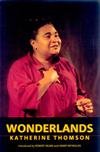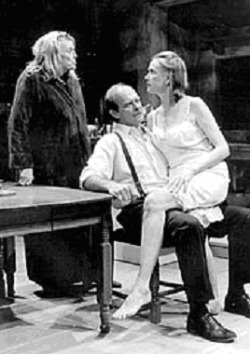Playmates
Playmates was formed in 2008. Members meet the second Tuesday of each month at the Hut in Callandoon Street. A variety of plays have been read since the first session including Chekov, Caryl Churchill and a selection of short comedies. The group have performed rehearsed play-readings at Kaloma, Live @ The Hut and the Breast Cancer Fundraising morning tea as well as at the Botanical Gardens BBQ. Their Live @ The Hut chorus featured regularly at, of all places, Live @ The hut.
10/5/2011 May Playreading: The Walworth Farce by Enda Walsh

The Walworth Farce
by Enda Walsh
It’s 11 in the morning in a council flat on the Walworth Road in London. In two hours time, as is normal, three Irish men will have consumed six cans of Harp, fifteen crackers with spreadable cheese, ten pink biscuit wafers and one oven cooked chicken with a strange blue sauce. In two hours time, as is normal, five people will have been killed.
Hilarious, horrifying and ferociously entertaining, The Walworth Farce is an achingly tender insight into what happens when we become stuck in the stories we tell ourselves about our lives.
From Galway to Edinburgh, from London to New York, the Druid Theatre Company’s production of The Walworth Farce has wowed audiences everywhere.
"…loud, mad and viciously theatrical. It's ranting virtuosity and exceptionally grounded performances make it remarkable." - Time Out London
"…a theatrical experience that claws at the imagination for days afterwards…" - Variety
"exhilarating to watch" - The Australian
by Enda Walsh
It’s 11 in the morning in a council flat on the Walworth Road in London. In two hours time, as is normal, three Irish men will have consumed six cans of Harp, fifteen crackers with spreadable cheese, ten pink biscuit wafers and one oven cooked chicken with a strange blue sauce. In two hours time, as is normal, five people will have been killed.
Hilarious, horrifying and ferociously entertaining, The Walworth Farce is an achingly tender insight into what happens when we become stuck in the stories we tell ourselves about our lives.
From Galway to Edinburgh, from London to New York, the Druid Theatre Company’s production of The Walworth Farce has wowed audiences everywhere.
"…loud, mad and viciously theatrical. It's ranting virtuosity and exceptionally grounded performances make it remarkable." - Time Out London
"…a theatrical experience that claws at the imagination for days afterwards…" - Variety
"exhilarating to watch" - The Australian
12/4/2011 April Playreading: Amadeus by Peter Shaffer
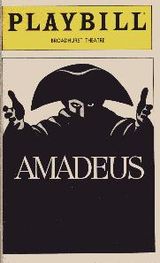
At the opening of the tale, Salieri is an old man, having long outlived his fame, and is convinced he used poison to assassinate Mozart. Speaking directly to the audience, he promises to explain himself. The action then flashes back to the eighteenth century, at a time when Salieri has not met Mozart in person, but has heard of him and his music. He adores Mozart's compositions, and is thrilled at the chance to meet Mozart in person, during a salon at which some of Mozart's compositions will be played. When he finally does catch sight of Mozart, however, he is deeply disappointed to find that Mozart's personality does not match the grace or charm of his compositions. When Salieri first meets him, Mozart is crawling around on his hands and knees, engaging in profane talk with his future bride Constanze Weber. Salieri cannot reconcile Mozart's boorish behaviour with the genius that God has inexplicably bestowed upon him. Indeed, Salieri, who has been a devout Catholic all his life, cannot believe that God would choose Mozart over him for such a gift. Salieri renounces God and vows to do everything in his power to destroy Mozart as a way of getting back at his Creator."
The play is a memory play. It is fixed in Salieri's mind. This is his recollection, his argument, his justification. However, within the objective story, the characters are fixed in their attitudes. The Court is fixed in its ways, the Emperor is fixed in his ways. Salieri is fixed in his desire for fame. Mozart is fixed in his personality and his thinking. Even Constanze is fixed in her regard for Mozart, and her desire to help him.
The play is a memory play. It is fixed in Salieri's mind. This is his recollection, his argument, his justification. However, within the objective story, the characters are fixed in their attitudes. The Court is fixed in its ways, the Emperor is fixed in his ways. Salieri is fixed in his desire for fame. Mozart is fixed in his personality and his thinking. Even Constanze is fixed in her regard for Mozart, and her desire to help him.
8/3/2011 March Playreading: Eat my shorts
A selection of various short plays.
I don't believe in astrology. The only stars I can blame for my failures are those that walk about the stage.
Noel Coward
Noel Coward's revue sketches and parodies. Sketches and monologues from European Cabaret Performance 1890- 1920. Also featuring the debut script of local playwright, Angela Clarke, What comes after coffee?
I don't believe in astrology. The only stars I can blame for my failures are those that walk about the stage.
Noel Coward
Noel Coward's revue sketches and parodies. Sketches and monologues from European Cabaret Performance 1890- 1920. Also featuring the debut script of local playwright, Angela Clarke, What comes after coffee?
The man in the red scarf
Aristide Bruant (6 May 1851 – 10 February 1925) was a French cabaret singer, comedian, and nightclub owner. He is best known as the man in the red scarf and black cape featured on certain famous posters by Henri de Toulouse-Lautrec. Born Louis Armand Aristide Bruand in the village of Courtenay, Loiret in France, Bruant left his home in 1866 at age fifteen, following his father's death, to find employment. Making his way to the Montmartre Quarter of Paris, he hung out in the working-class bistros, where he finally was given an opportunity to show his musical talents. Although bourgeois by birth, he soon adopted the earthy language of his haunts, turning it into songs that told of the struggles of the poor.
Bruant began performing at cafe-concerts and developed a singing and comedy act that led to his being signed to appear at the Le Chat Noir club. Dressed in a red shirt, black velvet jacket, high boots, and a long red scarf, and using the stage name Aristide Bruant, he soon became a star of Montmartre, and when Henri de Toulouse-Lautrec began showing up at the cabarets and clubs, Bruant became one of the artist's first friends.
In 1885, Bruant opened his own Montmartre club, a place he called "Le Mirliton". Although he hired other acts, Bruant put on a singing performance of his own. As the master of ceremonies for the various acts, he used the comedy of the insult to poke fun at the club's upper-crust guests who were out "slumming" in Montmartre. His vaudeville-inspired mix of song, satire and entertainment developed into the musical genre called chanson réaliste.
Bruant died in Paris and was buried in the cimetière de Subligny, near his birthplace in the département of Loiret. A street in Paris was named in his honor.
Bruant began performing at cafe-concerts and developed a singing and comedy act that led to his being signed to appear at the Le Chat Noir club. Dressed in a red shirt, black velvet jacket, high boots, and a long red scarf, and using the stage name Aristide Bruant, he soon became a star of Montmartre, and when Henri de Toulouse-Lautrec began showing up at the cabarets and clubs, Bruant became one of the artist's first friends.
In 1885, Bruant opened his own Montmartre club, a place he called "Le Mirliton". Although he hired other acts, Bruant put on a singing performance of his own. As the master of ceremonies for the various acts, he used the comedy of the insult to poke fun at the club's upper-crust guests who were out "slumming" in Montmartre. His vaudeville-inspired mix of song, satire and entertainment developed into the musical genre called chanson réaliste.
Bruant died in Paris and was buried in the cimetière de Subligny, near his birthplace in the département of Loiret. A street in Paris was named in his honor.
14/9/2010 October Playreading: Ruined by Lynn Nottage
Ben Brantley in his The New York Times review, wrote: "Ms. Nottage, the wide-ranging and increasingly confident author of Intimate Apparel and Fabulation or, the Re-Education of Undine, hooks her audience with promises of a conventionally structured, purposefully plotted play, stocked with sympathetic characters and informative topical detail. She delivers on those promises. Yet a raw and genuine agony pulses within and finally bursts through this sturdy framework, giving Ruined an impact that lingers beyond its well-shaped, sentimental ending. . . . Ms. Nottage has endowed the frail-looking Sophie, as well as the formidable Mama, with a strength that transforms this tale of ruin into a clear-eyed celebration of endurance."[6]
14/9/2010 September Playreading: Osage. Orange County by Tracey Letts
Winner of the 2008 Pulitzer Prize and Tony Award® for Best Play “…the most exciting new American play Broadway has seen in years.”
- Charles Isherwood, The New York Times
August: Osage County is a grand, gripping new play which tells the story of the Westons, a large extended clan that comes together at their rural Oklahoma homestead when the alcoholic patriarch disappears. Forced to confront unspoken truths and astonishing secrets, the family must also contend with Violet, a pill-popping, deeply unsettled grandmother at the center of this storm.
August: Osage County is a rare theatrical event — a large-scale work filled with unforgettable characters, a powerful tale told with unflinching honesty.
10/8/2010 August Playreading: The Clean House by Sarah Ruhl
The Clean House is a comedy about clean homes and messy lives.
Matilde has moved to the United States after her parents - the funniest couple in Brazil - literally died laughing. She is hired as a live-in maid by Lane, a successful doctor who values order in every aspect of her life. But cleaning proves to be a thoroughly depressing occupation for Matilde, who would much rather spend her time concocting jokes in the tradition of her beloved parents.
As luck would have it, Lane's modest sister Virginia thrives on cleaning and secretly begins to take over the maid's duties, allowing Matilde to create the world's funniest joke. When Lane's husband, a surgeon, unexpectedly falls in love with Ana, one of his cancer-stricken patients, everything that was clean and tidy for Lane - her house, her emotions, her relationships - is thrown into disarray, and Matilde must come to her rescue.
Forced to pick up the pieces and closely evaluate their lives, Matilde, Lane, Virginia and Ana come to find an uncommon bond filled with comedy and tragedy as they begin to discover what living and dying are all about, and how shared laughter can heal almost everything.
"Sarah Ruhl wrote The Clean House before she was thirty and as a result received a MacArthur Fellowship (nicknamed the Genius Award!). A leading light in the new guard of American playwrights, Ruhl's utterly original vision of the world celebrates dancing and laughter, ice cream, gold fish and a good cup of coffee. Who could resist such a wonderful concoction brimful of magic realism?" Kate Cherry To read a review of QTC's production of The Clean House...
Watch playwright Sarah Ruhl on the humor in THE CLEAN HOUSE, and on the inspiration for In the next Room.
Matilde has moved to the United States after her parents - the funniest couple in Brazil - literally died laughing. She is hired as a live-in maid by Lane, a successful doctor who values order in every aspect of her life. But cleaning proves to be a thoroughly depressing occupation for Matilde, who would much rather spend her time concocting jokes in the tradition of her beloved parents.
As luck would have it, Lane's modest sister Virginia thrives on cleaning and secretly begins to take over the maid's duties, allowing Matilde to create the world's funniest joke. When Lane's husband, a surgeon, unexpectedly falls in love with Ana, one of his cancer-stricken patients, everything that was clean and tidy for Lane - her house, her emotions, her relationships - is thrown into disarray, and Matilde must come to her rescue.
Forced to pick up the pieces and closely evaluate their lives, Matilde, Lane, Virginia and Ana come to find an uncommon bond filled with comedy and tragedy as they begin to discover what living and dying are all about, and how shared laughter can heal almost everything.
"Sarah Ruhl wrote The Clean House before she was thirty and as a result received a MacArthur Fellowship (nicknamed the Genius Award!). A leading light in the new guard of American playwrights, Ruhl's utterly original vision of the world celebrates dancing and laughter, ice cream, gold fish and a good cup of coffee. Who could resist such a wonderful concoction brimful of magic realism?" Kate Cherry To read a review of QTC's production of The Clean House...
Watch playwright Sarah Ruhl on the humor in THE CLEAN HOUSE, and on the inspiration for In the next Room.
13/7/2010 July Playreading: 'The God of Carnage' by Yasmina Reza

What happens when two sets of parents meet up to deal with the unruly behaviour of their children? A calm and rational debate between grown-ups about the need to teach kids how to behave properly? Or a hysterical night of name-calling, tantrums and tears before bed-time? Boys will be boys, but adults are usually worse - much worse.
Yasmina Reza is a French playwright and novelist, based in Paris, whose works have all been multi- award winning, critical and popular international successes. Le Dieu du Carnage opened on 8 december 2006 at the Schauspielhaus in Zurich, dirceted by Jurgen Gosch, and in aris on 25 January 2008 at the Theatre Antoine, directed by the author with Isabelle Huppert.
Read Broadway production review.
Yasmina Reza is a French playwright and novelist, based in Paris, whose works have all been multi- award winning, critical and popular international successes. Le Dieu du Carnage opened on 8 december 2006 at the Schauspielhaus in Zurich, dirceted by Jurgen Gosch, and in aris on 25 January 2008 at the Theatre Antoine, directed by the author with Isabelle Huppert.
Read Broadway production review.
13/6/2010 June Playreading: Short Plays

This month's playreading will be a selection of short plays. To paraphrase Spencer Tracey’s description of Katherine Hepburn: There’s not much meat on them, but what’s there is choice.
Lost byMary Louise Wilson
A portrait of two aging friends who can’t remember a thing. First performed at Actors & Writers in Olivebridge, NY on Nov 11 2000, with the Tony award-winning playwright directing the cast.
Medea by Christopher Durang and Wendy Wasserstein
An hilarious take on the original. Co-written for the Juilliard School’s Drama Division’s twenty-fifth anniversary, April 25th, 1994 at the Juilliard Theatre NYC.
No Shoulder by Nina Shengold
A childless woman discovers an unforeseen bond with a teenage hitchhiker. First presented as a stage reading at Actors & Writers in Oct 1999 – premiered on May 3 2000 at Stage Works, Hudson, New York as part of the ten by ten festival.
Lost byMary Louise Wilson
A portrait of two aging friends who can’t remember a thing. First performed at Actors & Writers in Olivebridge, NY on Nov 11 2000, with the Tony award-winning playwright directing the cast.
Medea by Christopher Durang and Wendy Wasserstein
An hilarious take on the original. Co-written for the Juilliard School’s Drama Division’s twenty-fifth anniversary, April 25th, 1994 at the Juilliard Theatre NYC.
No Shoulder by Nina Shengold
A childless woman discovers an unforeseen bond with a teenage hitchhiker. First presented as a stage reading at Actors & Writers in Oct 1999 – premiered on May 3 2000 at Stage Works, Hudson, New York as part of the ten by ten festival.
11/5/2010 May Playreading: 'Shadowlands' by William Nicholson
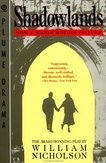
William Nicholson's Tony nominated stage adaptation of his award-winning BBC Teleplay relates to the story of shy Oxford don and children's author C.S. Lewis and American poet Joy Gresham. Shadowlands shows how love, and the risk of loss, transformed this great man's relationships - its joyous start and tragic finale - even with God.
13/4/2010 April Playreading: 'The Beauty Queen of Leenane' by Martin McDonagh

The Beauty Queen of Leenane
by Martin McDonagh
Set in a backwater village in the West of Ireland, The Beauty Queen of Leenane is a brilliant black comedy by award winning Irish playwright Martin McDonagh.
Maureen, a middle-aged spinster, lives with her elderly, manipulative mother Mag. Maureen’s sisters have flown the nest, escaping the drab family home but Maureen, who has a history of mental illness, remains at home, trapped in a dysfunctional relationship with her mother.
The arrival of an invitation sparks hopes of a last-chance romance and offers Maureen the prospect of an escape to a new life. Things might just be looking up for her… But not if the interfering Mag has anything to do with it.
With hope scuppered and long suppressed hatred unleashed Maureen becomes intent on wreaking a terrible revenge, which will bring the play to its horrifying conclusion.
Loaded with savage irony, surreal humor and a touch of melodrama Martin McDonagh’s The Beauty Queen of Leenane looks at the malevolence of people leading hopeless lives.
here to edit.
"[McDonagh is] the most wickedly funny, brilliantly abrasive young dramatist on either side of the Irish Sea.... He is a born storyteller."--New York Times
The song The Spinning Wheel sung by Delia Murphy, features in the play. Delia Murphy (1902-1971) was a singer and collector of Irish ballads. Some knew her as "The Queen of Connemara." The lyrics of "The Spinning Wheel" describe a young maiden sneaking out to walk with her love, deceiving her dozing blind grandmother, who believes the girl is still sitting near her, spinning.
by Martin McDonagh
Set in a backwater village in the West of Ireland, The Beauty Queen of Leenane is a brilliant black comedy by award winning Irish playwright Martin McDonagh.
Maureen, a middle-aged spinster, lives with her elderly, manipulative mother Mag. Maureen’s sisters have flown the nest, escaping the drab family home but Maureen, who has a history of mental illness, remains at home, trapped in a dysfunctional relationship with her mother.
The arrival of an invitation sparks hopes of a last-chance romance and offers Maureen the prospect of an escape to a new life. Things might just be looking up for her… But not if the interfering Mag has anything to do with it.
With hope scuppered and long suppressed hatred unleashed Maureen becomes intent on wreaking a terrible revenge, which will bring the play to its horrifying conclusion.
Loaded with savage irony, surreal humor and a touch of melodrama Martin McDonagh’s The Beauty Queen of Leenane looks at the malevolence of people leading hopeless lives.
here to edit.
"[McDonagh is] the most wickedly funny, brilliantly abrasive young dramatist on either side of the Irish Sea.... He is a born storyteller."--New York Times
The song The Spinning Wheel sung by Delia Murphy, features in the play. Delia Murphy (1902-1971) was a singer and collector of Irish ballads. Some knew her as "The Queen of Connemara." The lyrics of "The Spinning Wheel" describe a young maiden sneaking out to walk with her love, deceiving her dozing blind grandmother, who believes the girl is still sitting near her, spinning.
10/3/2010 March Playreading: 'Wonderlands' by Katherine Thomson
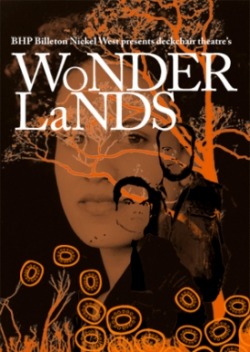
In 1931, Alice, a white station owner, goes riding with her Aboriginal head stockman and friend, Jim. During the course of the afternoon, they come to an agreement about the running and ownership of the property, Ambertrue. Many years later, in an environment of white paranoia fed by misinformation, Alice’s great nephew Lon finds himself running Ambertrue. When Lon receives a letter announcing a native title claim in the area, he is terrified that his dream of passing the family property on to his son-in-law will be shattered. Wonderlands is a political thriller that deals with the thorny issues of Native Title and Pastoral Leases. It takes a writer of Thomson’s calibre to take this subject matter and create a play that is as much about love, friendship and belonging as it is about one of the big issues of our time.
"...the problems of the wide brown land in black and white ...great entertainment, grabbing hold like a triller and with plenty of political and emotional bite" Colin Rose, Sun Herald
Winner of Rodney Seaborn Playwright's Award, Katherine Thomson began her career in the theatre as an actor. For the stage she has written Harbour, Navigating, Diving for Pearls, Barmaids, Mavis Goes to Timor and Wonderlands all published by Currency. Other plays performed by leading theatre companies include Kayak, A Sporting Chance, Darlinghurst Nights and This Hospital is My Country. She has also written extensively for television where her credits include Grass Roots, Blackjack, Wildside, Fallen Angels, Halifax fp, GP and Something in the Air.
She has been nominated for five New South Wales Premier’s Literary Awards, winning for Harbour and three Australian Film Institute Awards and has won multiple AWGIEs — three in 2006 alone, two as co-writer of the television series Answered by Fire and a third for her screenplay for the film Unfolding Florence — The Many Lives of Florence Broadhurst. She has been Vice-President of the Australian Writers’ Guild and President of Sydney PEN. In 2005 she received the ANPC Award for her contribution to the Australian theatre industry.
"...the problems of the wide brown land in black and white ...great entertainment, grabbing hold like a triller and with plenty of political and emotional bite" Colin Rose, Sun Herald
Winner of Rodney Seaborn Playwright's Award, Katherine Thomson began her career in the theatre as an actor. For the stage she has written Harbour, Navigating, Diving for Pearls, Barmaids, Mavis Goes to Timor and Wonderlands all published by Currency. Other plays performed by leading theatre companies include Kayak, A Sporting Chance, Darlinghurst Nights and This Hospital is My Country. She has also written extensively for television where her credits include Grass Roots, Blackjack, Wildside, Fallen Angels, Halifax fp, GP and Something in the Air.
She has been nominated for five New South Wales Premier’s Literary Awards, winning for Harbour and three Australian Film Institute Awards and has won multiple AWGIEs — three in 2006 alone, two as co-writer of the television series Answered by Fire and a third for her screenplay for the film Unfolding Florence — The Many Lives of Florence Broadhurst. She has been Vice-President of the Australian Writers’ Guild and President of Sydney PEN. In 2005 she received the ANPC Award for her contribution to the Australian theatre industry.
16/2/2010 February Playreading: 'Wit' by Margaret Edson

Wit is the first play written by American playwright Margaret Edson. Edson used her work experience in a hospital as part of the inspiration for her play. Wit received its world premiere at South Coast Repertory, Costa Mesa, California, in 1995. Long Wharf Theater in New Haven, Connecticut subsequently staged the play in November 1997, with Kathleen Chalfant in the lead role. Chalfant received strong praise for her performance. She also incorporated her own life experience into her work on the play, including the final illness and death of her brother Alan Palmer from cancer. The play moved to the Union Square Theater in December 1998, after its successful initial run in New York City.
Wit won the 1999 Pulitzer Prize for Drama. The play also received the "Best New Play" award for 1999 from the New York Drama Critics' Circle. In 2001, the play was adapted into a cable television film with Emma Thompson as Vivian Bearing.
Read more about 'Wit' here.
Wit won the 1999 Pulitzer Prize for Drama. The play also received the "Best New Play" award for 1999 from the New York Drama Critics' Circle. In 2001, the play was adapted into a cable television film with Emma Thompson as Vivian Bearing.
Read more about 'Wit' here.

